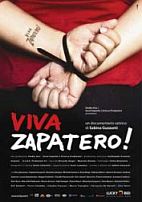 BELA LUSCONI'S DEAD BELA LUSCONI'S DEAD
Notes on the Crisis of Berlusconism and the So-Called "Cultural Hegemony" of the Italian Left
by Wu Ming 1
The virginal brides file past his tomb
Strewn with time's dead flowers
Bereft in deathly bloom
Alone in a darkened room
Undead, undead, undead.
Bauhaus, Bela Lugosi's Dead
Five Days Before the Election
Today is the 5th of April 2006, five days before the most important election in the history of Italy, after five years of plunder, intimidation and sadness. I share with many other observers the feeling that, even if Berlusconi won the election again, he'd do it by the skin of his teeth, in a situation of deep crisis. Italy's bad spell (well, at least that particular spell) is nearly over. Berlusconism is nearly over. Italy will still suck, but it will suck a little less. At least I hope so. It is undisputably better to be knee-deep in shit, than to be eye-deep in shit. Berlusconi is the worst thing that could happen to this country since Fascism. It's been a nightmarish decade since he "took to the field". I never thought I could see anything like that in Western Europe, and I hope I don't see it ever again.
Too Small a Rug and Too Much Dust
It is a common assumption that Berlusconism is in crisis because its failures are ever more apparent to a growing number of people. In fact the opposite is true: the failures of Berlusconism are visible because Berlusconism is in crisis, and it is in crisis because, in spite of blatant media bias and the conflict of interest, Berlusconi was not able to break through on the battlefield of cultural hegemony.
I am using the word "culture" in its broader meanings, "the customs, arts, social institutions etc, of a particular group or nation" (The Oxford Dictionary of English). "The integrated pattern of human knowledge, belief, and behavior that depends upon man's capacity for learning and transmitting knowledge to succeeding generations; the customary beliefs, social forms, and material traits of a racial, religious, or social group;" (The Merriam-Webster Dictionary of American English).
It is not by chance that the main subject of complaint from right-wing intellectuals is the so-called "cultural hegemony of the Left".
On that level, Berlusconism encountered the resistance - at times active, at times passive but it was enough - of an extended, articulated civil society, composed of various clubs and associations, family traditions, circles of friends, grassroots communities, small institutions, blogs, and means of "alternative" communication and information. There is a huge portion of country, at least half of the population, that's not inclined to "berlusconization". The mere existence of this half of the country makes it impossible to hide the dust under the rug of consent. The rug isn't big enough.
Strung to the Extreme
 A clear evidence that Berlusconi didn't break through is the fact that even (and especially) his media and book companies are crammed with "non-berlusconized" people, left-wing people, groups and individuals who not only disagree with his beliefs and practices, but also fight against them and seek to provide non-berlusconized content. A clear evidence that Berlusconi didn't break through is the fact that even (and especially) his media and book companies are crammed with "non-berlusconized" people, left-wing people, groups and individuals who not only disagree with his beliefs and practices, but also fight against them and seek to provide non-berlusconized content.
The reason this happens is that "pro-Berlusconi intellectual" is a contradiction in terms and "pro-Berlusconi artist" is little more than a sick joke. Brainworkers are on the other side. If you want to set up and run a publishing house or a decent newspaper, you badly need to hire non-Berlusconized personnel.
In the cultural battle, the role of these people is a crucial one. They operate where contradictions are deeper but still in balance, where the rope is strung very tight but hasn't broken off yet.
Given the bizarre, tangled situation of Italy, we the Wu Ming collective walk precisely on that rope. We've been doing it ever since bankrupt forced our publisher Einaudi - the most prestigious left-wing/liberal/antifascist publishing house in Italy - to become a sub-label of the Mondadori colossus, whose main shareholder is Berlusconi's Fininvest.
This happened in the early Nineties. Most authors and editors who worked at Einaudi decided to stay, resist, and guarantee the independence of contents and editorial choices. It was also a matter of saving the most important book catalogue in the country, including such authors as Gramsci, Marx (both Karl and Groucho), Adorno, Benjamin, Agamben, Pasolini, Herzen, Sartre, Barthes, Fanon, Tzara, Breton, Artaud, Gandhi, George Jackson, Angela Davis and many more.
We've always had complete control on our output, we have imposed a copyleft notice on our books and, generally speaking, we manage to do whatever we please, in happy and thorough self-management. And yet it is a contradiction, we hover between bargaining power (for our books sell very well) and political hindrance, at a a sector of the market where the comb is slower to reach the knot. A sector that's smaller and less visible than television, where the rope broke off and "hostile" journalists and comedians were purged.
Our interest never coincided with Berlusconi's endurance in power. We have nothing to lose by his ruin, we have a world to win. Einaudi existed long before this guy was born, and will still exist after his downfall. If he's defeated, really defeated, than he'll also lose his media empire and end up in the dustbin of history, while books will always be written and read and we'll keep telling stories. It shouldn't be difficult to find new owners for Einaudi and its prestigious catalogue. Certainly we aren't willing to go away before this takes place, unless we are purged. An old working class motto says: 'Resist one minute longer than your boss'. We won't leave this publisher because we've conquered a full autonomy and because, with all the flaws, it is still the best publisher in the country.
In the past years, a few superficial critics attacked the authors who hadn't left Einaudi, the artists and journalists who worked at Mediaset TV channels, and the actors and directors making films with Medusa Cinematografica. In the name of the defeatist sectarianism that always plagued the Left, these people were accused of 'collaboration with the enemy', even in the cases where they were actively supporting the social movements, on the front of the struggle against the government.
This was very stupid, it just ran the risk of creating confusion and spread simplistic descriptions of the relationship between power, culture, and resistance. In fact, the opposite was and is true: all those people are in the best position to create short-circuits, and they rarely missed the opportunity to do so. We can cite several examples of cultural guerrilla warfare exploiting this contradiction.
Dario Fo and the Two-Headed Anomaly
One of our fellow travellers in this journey to the end of Berlusconism is the dramatist and Nobel-prize winner Dario Fo, whose works are published by Einaudi. At the end of 2003 Fo wrote and prepared to stage in Milan a wild, satirical play on Berlusconi titled The Two-Headed Anomaly. The ensuing reaction by Berlusconi's clique was reported by The Guardian on January 14, 2004:
 A member of Silvio Berlusconi's party, Forza Italia, is suing Dario Fo, the literature Nobel prizewinner, for defamation in his new play. A member of Silvio Berlusconi's party, Forza Italia, is suing Dario Fo, the literature Nobel prizewinner, for defamation in his new play.
Marcello Dell'Utri, a Forza Italia senator, is demanding €1m (£700,000) for damages caused by "unfounded, personal attacks" made by Mr Fo in his satirical play The Two-headed Anomaly.
"Dario Fo has always been a great artist; no one contests that," said Mr Dell'Utri's lawyer, Pietro Federico. "But this is not satire. This is persecution. Satire is meant to make people laugh about real facts. But Dario Fo is giving false information. He is careless. It has damaged my client's honour."
[...] "These people want to shut everyone up," Mr Fo's wife, Franca Rame, told the newspaper La Repubblica.
In the double act, Mr Fo and Ms Rame play the Italian prime minister and his wife, Veronica Lario. Mr Fo plays a puppet-like, short, fat character, gesticulating and pouring out his troubles to his wife.
His friend Vladimir Putin comes to stay in a Sicilian villa but is shot by Chechen rebels. Part of Mr Putin's brain is transplanted into Mr Berlusconi's, turning him into a confused, vodka sloshing, Russian speaker worried about some men trapped in a submarine.
Throughout the show, the prime minister is attacked for everything from being vertically challenged to passing laws to his own personal advantage, running a media monopoly and censoring criticism of his government.
[...] "We are tired," Mr Fo, 77, said. "But we felt we could not sit by and watch what is happening in Italy." As critics of Mr Berlusconi have been barred from the state broadcaster Radiotelevisione Italia, Mr Fo protests that artists are being "defenestrated" metaphorically from the RAI for the same reasons that leftwing dissidents were literally thrown out of police station windows in the 1970s when Mr Fo wrote his work Accidental Death of an Anarchist.
In references to Mr Dell'Utri, who is on trial for allegedly laundering mafia money through Mr Berlusconi's Publitalia advertising firm, Mr Fo accuses the senator of links to the Mafia and drug trafficking.
A Mafia supergrass, Antonino Giuffre, has alleged that Sicilian-born Mr Dell'Utri, a Forza Italia founder and former business associate of Mr Berlusconi's, helped talk the mafia into switching its support to Mr Berlusconi's Forza Italia party in the early 1990s.
[...] Mr Fo plans to transmit his theatre show live on giant screens to theatres across the country. Mr Dell'Utri's lawyers have also contacted Sky Italia satellite television to dissuade it from broadcasting The Two-headed Anomaly later his year. |
Berlusconi's most important henchman had freaked out and threatened one of the most important authors in the world, whose books were (and still are) published by Einaudi, which is formally owned by Berlusconi! Dario Fo was creating a fecund paradox, effectively fighting guerrilla warfare "from the inside". The contradiction was at its maximum, and yet the rope managed not to break off.
Less than one year later, on December 11, 2004, the Tribunal of Palermo sentenced Dell'Utri to nine years of prison, for complicity to mafia crimes.
RAIot. Weapons of Mass Distraction
 On November 17, 2003, RAI (the public television) broadcast the first instalment of a late night comedy show titled RAIot (pronounced 'riot') - Weapons of Mass Distraction. It was a stand-up act by comedian Sabina Guzzanti, whose books and DVDs were published by Einaudi and Mondadori. On November 17, 2003, RAI (the public television) broadcast the first instalment of a late night comedy show titled RAIot (pronounced 'riot') - Weapons of Mass Distraction. It was a stand-up act by comedian Sabina Guzzanti, whose books and DVDs were published by Einaudi and Mondadori.
The show was a detailed indictment of Berlusconi's power and a description of the dubious ways the tycoon had financed the birth of his media group. One feature of the show was a graphic which showed Berlusconi's media group Mediaset winning in the advertising war with the rest of the country's media, thanks to the prime minister's conflict of interest. Mediaset shares dropped on the stock exchange after the show.
Once again, there was a violent reaction: Mediaset took legal action against the comedian, and a representative of the corporation stated that Guzzanti had disseminated "lies and extremely serious insinuations", which had "harmed the honour of a company registered on the stock exchange".
In plain words, Berlusconi's media group, part of the Fininvest corporate empire, had sued an author whose books were published by Mondadori, whose main shareholder was (and still is) Fininvest. A criss-cross internal legal action, an act of cannibalism. Guzzanti too had effectively created a paradox. No-one could accuse her of "collaboration" with Berlusconi.
As a result, the remaining five installments of the show were cancelled, allegedly for economic reasons, i.e. the millions of euros RAI ran the risk of paying to Mediaset. Across the country there were mass demonstrations in solidarity with Guzzanti.
On January 31, 2004, the Tribunal of Milan sentenced that the legal action against Guzzanti was groundless. Guzzanti's stand-up act had not been slanderous and no false accusation had been made during the show. No wonder Berlusconi describes Italian judges as 'communists' and 'mentally-ill'.
Guzzanti took inspiration by this chain of events and filmed a documentary on freedom of speech in the age of Berlusconi. The film, provocatively titled Viva Zapatero!, was released in 2005 and screened at several cinema festival in Europa and the Americas. It certainly helped to raise consciousness of what was happening in Italy.
Radio Alice at the Venice Film Festival
 In September 2004 Guido Chiesa's film Radio Alice (original title: Lavorare con lentezza) was screened at the Venice Film Festival. One of the organizers and hosts of the festival is RAI. In September 2004 Guido Chiesa's film Radio Alice (original title: Lavorare con lentezza) was screened at the Venice Film Festival. One of the organizers and hosts of the festival is RAI.
The film is an Italo-French production, the Italian producer was Fandango, partially financed by Medusa Cinematografica, the biggest house of productions in Italy, which is owned by Fininvest. Medusa controls most of the cinema business in Italy.
The screenplay was co-authored by us. It tells a slightly fictionalized version of the story of Radio Alice, the most famous free radio station of the Italian 1970's. Radio Alice had an active role during the 1977 student riots in Bologna. The centre of the town exploded after the carabinieri shot to death a 25-year-old leftist militant.
Radio Alice is an unmistakably radical movie, with a lot of tongue-and-cheek references to the present situation. Some critics wrote that it was "an irresponsible film" and "a panegyric of political violence".
The fact that Medusa funds were used to make a film like that is another evidence that things are very complex in this country, to say the least.
The film immediately drew the hatred of a member of the RAI administration council appointed by the Berlusconi government. This guy's name is Marcello Veneziani, usually described as "right-wing intellectual", i.e. a living oxymoron, with three letters too many. The whole top management of RAI had co-produced another film and was aggressively lobbying for awards. In the past editions of the festival, italian cinema had cut sorry figures, and the right-wing bore neo-nationalistic grudges against "xenophilous commies in the jury".
Veneziani went as far as describing a "three-level leftwing mafia".
The lowest level acted in the stalls "hissing and booing at the ministers of the government and everyone smelling of Rai, Medusa, and Cinecitta" and "clapping hands at anyone sharing their ideology, like Spike Lee, even if his film sucks" [The film was She Hate Me].
The middle level was active in the press, "a clan of journalists that write divided but strike united, praise politically correct films, organize the supporters, lay enphasis on the hissing and booing, glorify anyone showing contempt for Bush and Berlusconi, and piss themselves at the sight of any nostalgic junk on the Seventies and Radio Alice."
The higher level was "the sacerdotal caste of producers, directors, engagés actors, and script authors. A transnational caste linking Spain, the US, the rest of Europe, and Bologna."
On the last night of the festival, Veneziani and other right-wing opinion leaders threw tantrums when the jury announced the awards.
The Golden Lion for best picture went to Vera Drake by Mike Leigh (a defence of abortion).
The Jury Grand Prix went to The Sea Inside by Alejandro Amenabar (a defence of euthanasia).
The Young Actor Award went to both Tommaso Ramenghi and Marco Luisi for Lavorare con lentezza/Radio Alice (a panegyric of political violence).
Fook-all went to the film RAI expected to win the Golden Lion.
Seething with rage, Veneziani stated: "We [i.e. RAI] are treated like hotelkeepers, we place the Lido and the Fenice theatre at the disposal of the festival, and yet we get nothing in exchange. They awarded abortion, euthanasia, and Radio Alice!"
The film critic of the newspaper L'Unità wrote: "It's true, they got nothing in exchange, because you don't organize festivals to get something in exchange, you do it to foster culture, screen the movies and help them to find an audience. Jurors are not paid by RAI yet, and they give awards to whomever they want. It's true, they awarded abortion, euthanasia, and Radio Alice, because they have thoughts of their own. For three years the right-wing has controlled the festival and yet they didn't manage to push it rightwards. They look for right-wing movies, right-wing directors, right-wing jurors, and they can find none. They look for right-wing critics, and not even the church can provide them.You know something? We feel sorry for those poor hotelkeepers".
Berlusconi is Overestimated
 The most common mistake by the Left was seeing Berlusconi as an omnipotent figure, more influent than he really was. From 1993 to 2002, even some of his foes regarded him as a great communicator, a strategist, an astute calculator, the only problem of the country, and the great Satan. The most common mistake by the Left was seeing Berlusconi as an omnipotent figure, more influent than he really was. From 1993 to 2002, even some of his foes regarded him as a great communicator, a strategist, an astute calculator, the only problem of the country, and the great Satan.
He was none of those things, he was just a mediocre man trapped in a role that outsized him. All those simulacra had been created by his PR people and then accepted as real even in the Left, where some people have always been more berlusconist than Berlusconi, because they accepted the enemy's description provided by the enemy himself.
Those simulacra have now broken down in pieces.
As an ideology, Berlusconism has entered a phase of structural crisis. It can be rescued and saved only by those anti-berlusconists who don't realize that, and keep describing it as powerful.
In 1993 Berlusconi "took to the field of politics" because he couldn't survive as a tycoon after his political referents had been wiped off by the "Clean Hands" anti-corruption inquiries and trials. He was very likely to end up in prison for corruption, money laundering and mafia-related activities. By entering politics and taking over, he could exert power directly, with no mediations, and pass laws that put spokes in the judiciary wheel.
Since the beginning, he could remain on the saddle only if he managed to project all of his personalities in one laser beam: he must keep depicting himself as an entrepreneur, a politician, a glamorous media attraction, and the founding father of a new country, a country made of gaudy plastic and consumerist dreams. So Nineties! A fascist twist on the New Economy frenzy.
After the brutal, murderous repression of the anti-G8 demonstrations in Genoa (July 2001) and the attacks on the Twin Towers in New York City two months later, a harsher reality discolored and darkened that oneiric landscape. Berlusconi jumped on the bandwagon of the War On Terror and pre-emptive invasions of souvereign countries. More than 80% of Italians opposed the war on Iraq, but he wanted to take part in it. The kid wanted the toy gun, no matter the cost in terms of popularity. It was the most telling sign that reality was going one way and Berlusconi was going another. His reassuring, smiling mask slowly began to split asunder.
Gradually his multifarious image entered a crisis. His self-descriptions as a media attraction and a founding father became the weakest links of the semiotic chain. As his charm wore out, he got ever more nervous and scared of ageing. Nowadays, after all those facelifts, eyelid repairs and hair transplants, it looks like his head is shrinking. He failed himself with his compulsive urge to be adored. In the meantime, he disgraced himself too many times, he cut too many poor figures. Berlusconi turned into Burlesquoni.
His coalition lost the 2002 election for local councils, the 2003 election for local councils, the 2004 election for local councils, the 2004 election for the European parliament, and the 2005 election for regional councils, even if he'd put all his energy into the campaign. Twelve regions out of fourteen are now administered by the centre-left coalition, and the right-wing has lost many important ramparts in North-Eastern Italy and Southern Italy. During Italy's six-month EU presidency in 2003, Burlesquoni was the laughingstock of the continent. He and his cronies lost all the libel suits they'd filed. His right-arms Previti and Dell'Utri were sentenced to many years of prison for corruption and mafia-related activities, they appealed, they're likely to lose again. The Iraqi war was a disaster and Italy got no benefit from its tardy and ludicrous participation. Several ministers and deputy-ministers of the government sparked diplomatic incidents (and even anti-Italian street riots in Bangazi, Lybia) by telling racist jokes in public or offending other peoples' religion, and they had to resign.
The reasons why Berlusconi, in spite of all the creaking, lasted in office for five years lay in the unfitness and ineptitude of the official opposition, the leaders of the centre-left, with their cowardice, their fetishism of "rules", their sense of "responsibility", their craving for "respectability", their dogma of "stableness", their hunting of "moderate votes" in a country where the centre doesn't exist anymore.
Berlusconi never scored goals because he was a good player: he scored them because the other team sucked. It isn't him who is a genius. It isn't him who is a strategist. It's the centre-left that is a confederacy of fools.
If it hadn't been for them, we would have gotten rid of Burlesquoni years ago.
You could say: better late than never. I agree, but let me add that too late equals to never, and we ran that risk. We're still running it, actually. If we win, we'll do it by the skin of our teeth. We still have teeth, haven't we?
|